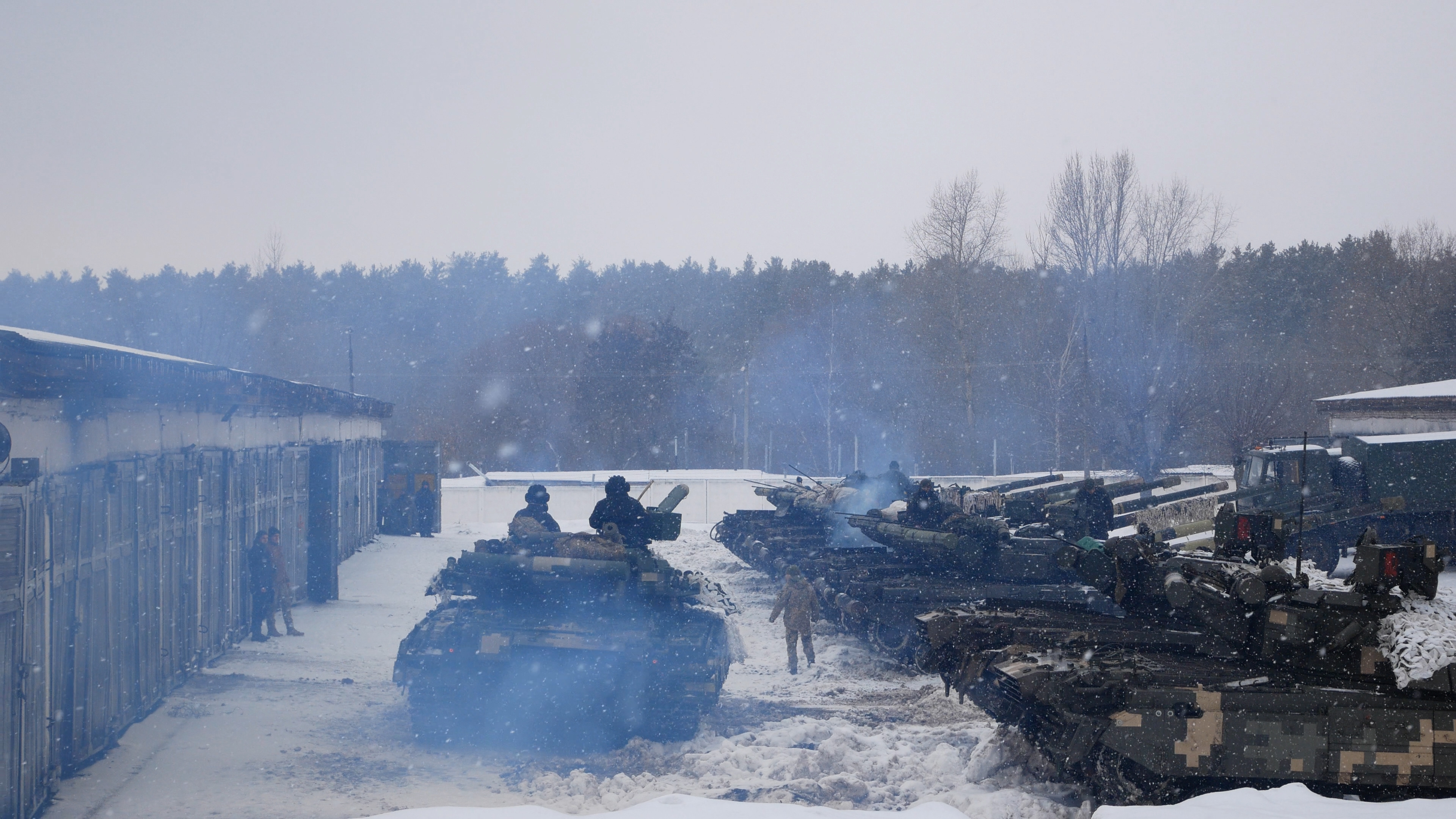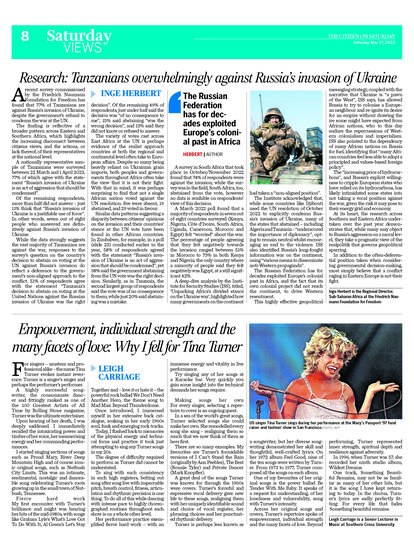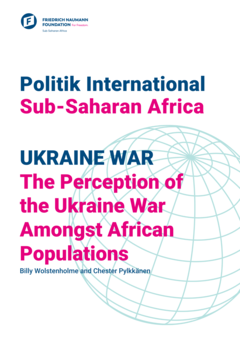UKRAINE WAR
The Perception of the Ukraine War Among African Populations

Kharkiv, Ukraine - January, 31, 2022: Tanks with tankers turn around and go to the training ground
© ShutterstockA recent survey commissioned by the Friedrich Naumann Foundation for Freedom has found that 77% of Tanzanians are against Russia’s invasion of Ukraine, despite the government’s refusal to condemn the war at the UN.
The finding is reflective of a broader pattern across Eastern and Southern Africa, which highlights the increasing disconnect between citizens views, and the actions, or lack thereof, of their representatives at the national level.
A nationally representative sample of Tanzanians were surveyed between 22 March and 1 April 2023, 77% of which agree with the statement “Russia’s invasion of Ukraine is an act of aggression that should be condemned”.
Of the remaining respondents, more than half did not answer – just 11% think that “Russia’s invasion of Ukraine is a justifiable use of force”. In other words, seven out of eight people who answered are definitively against Russia’s invasion of Ukraine.
While the data strongly suggests the vast majority of Tanzanians are against the war, responses to the survey’s question on the country’s decision to abstain on voting at the UN against Russia’s invasion do reflect a deference to the government’s non-aligned approach to the conflict. 51% of respondents agree with the statement “Tanzania’s decision to abstain on voting at the United Nations against the Russian invasion of Ukraine was the right decision”. Of the remaining 49% of respondents, just under half said the decision was “of no consequence to me”, 15% said abstaining “was the wrong decision”, and 13% said they did not know or refused to answer.
The variety of votes cast across East Africa at the UN is perhaps evidence of the realist approach countries at both the regional and continental level often take to European affairs. Despite so many being heavily reliant on Ukrainian grain imports, both peoples and governments throughout Africa often take the view that it is not their fight. With that in mind, it was perhaps surprising to find that not a single African nation voted against the UN resolution: five were absent, 19 abstained, and 29 voted in favour.
Similar data patterns suggesting a disparity between citizens’ opinions on the invasion and their countries’ stance at the UN vote have been found in other African countries. In Zimbabwe, for example, in a poll (slide 23) conducted earlier in the year, 58% of respondents agreed with the statement “Russia’s invasion of Ukraine is an act of aggression that should be condemned”, yet 38% said the government abstaining from the UN vote was the right decision. Similarly, as in Tanzania, the second largest group of respondents said the vote was of no consequence to them, while just 20% said abstaining was a mistake.
A survey in South Africa that took place in October/November 2022 found that 74% of respondents were against the invasion; while the survey was in the field, South Africa, too, abstained from the vote, however no data is available on respondents’ view of this decision.
A March 2022 poll found that a majority of respondents in seven out of eight countries surveyed (Kenya, Nigeria, Côte d’Ivoire, South Africa, Uganda, Cameroon, Morocco and Egypt) felt “worried” about the war. The percentage of people agreeing that they felt negatively towards the invasion ranged between 51% in Morocco to 73% in both Kenya and Nigeria; the only country where a minority of people said they felt negatively was Egypt, at a still significant 42%.
A deep-dive analysis by the Institute for Security Studies (ISS), titled, ‘Unpacking Africa’s divided stance on the Ukraine war’, highlighted how many governments on the continent had taken a “non-aligned position”.
The Institute acknowledged that, while some countries like Djibouti used the UN resolution of October 2022 to explicitly condemn Russia’s invasion of Ukraine, many of the states that abstained – including Algeria and Tanzania – “underscored the importance of diplomacy”, opting to remain neutral whilst encouraging an end to the violence. ISS also identified Russia’s long-fought information war on the continent, using “various means to disseminate anti-Western propaganda”.
The Russian Federation has for decades exploited Europe’s colonial past in Africa
OP ED PUBLISHED ON THE CITIZEN, TANZANIA


DOWNLOAD THE STUDY HERE
Thumb the pages of FAZ, the Times or Le Monde, and you may believe the world is united against Russia’s invasion of Ukraine. It is true that most do not support Putin’s war, as almost all United Nations’ votes on the subject attest to. But this grossly Eurocentric view ignores the fact that, at times, a quarter of UN member states have either abstained, were absent or rejected to vote with Ukraine.
Africa is over-represented within this sample. Yet several surveys across the continent suggest those governments that voted against or abstained, may not be in lockstep with those they represent when it comes to the war.
This policy paper aims to understand African populations' true perception of the war in Ukraine and explore their motivations behind these sentiments.
Jetzt registrieren und downloadenWenn Sie den Newsletter bereits abonniert haben, erhalten Sie nach Eingabe Ihrer E-Mail-Adresse den Download Link.
The Russian Federation has for decades exploited Europe’s colonial past in Africa, and the fact that its own colonial project did not reach the continent, to drive Western resentment.
This highly effective geopolitical messaging strategy, coupled with the narrative that Ukraine is “a pawn of the West”, ISS says, has allowed Russia to try to colonise a European neighbour and re-ignite its desire for an empire without drawing the ire some might have expected from African nations, who to this day endure the repercussions of Western colonialism and imperialism. ISS also pointed to the dependency of many African nations on Russia for fuel, identifying that “many African countries feel less able to adopt a principled and values-based foreign policy”.
The “increasing price of hydrocarbons”, and Russia’s explicit willingness to cripple European states who have relied on its hydrocarbons, has likely intimidated some states into not taking a vocal position against the war, given the risk it may pose to their energy grid and economy.
At its heart, the research across Southern and Eastern Africa undertaken over the past year demonstrates that, while many may object to Russia’s aggression on a moral level, they take a pragmatic view of the realpolitik that governs geopolitical sparring.
In addition to the often-deferential position taken when considering governmental decision-making, most simply believe that a conflict raging in Eastern Europe is not their fight.
Inge Herbert is the Regional Director, Sub-Saharan Africa at the Friedrich Naumann Foundation for Freedom
